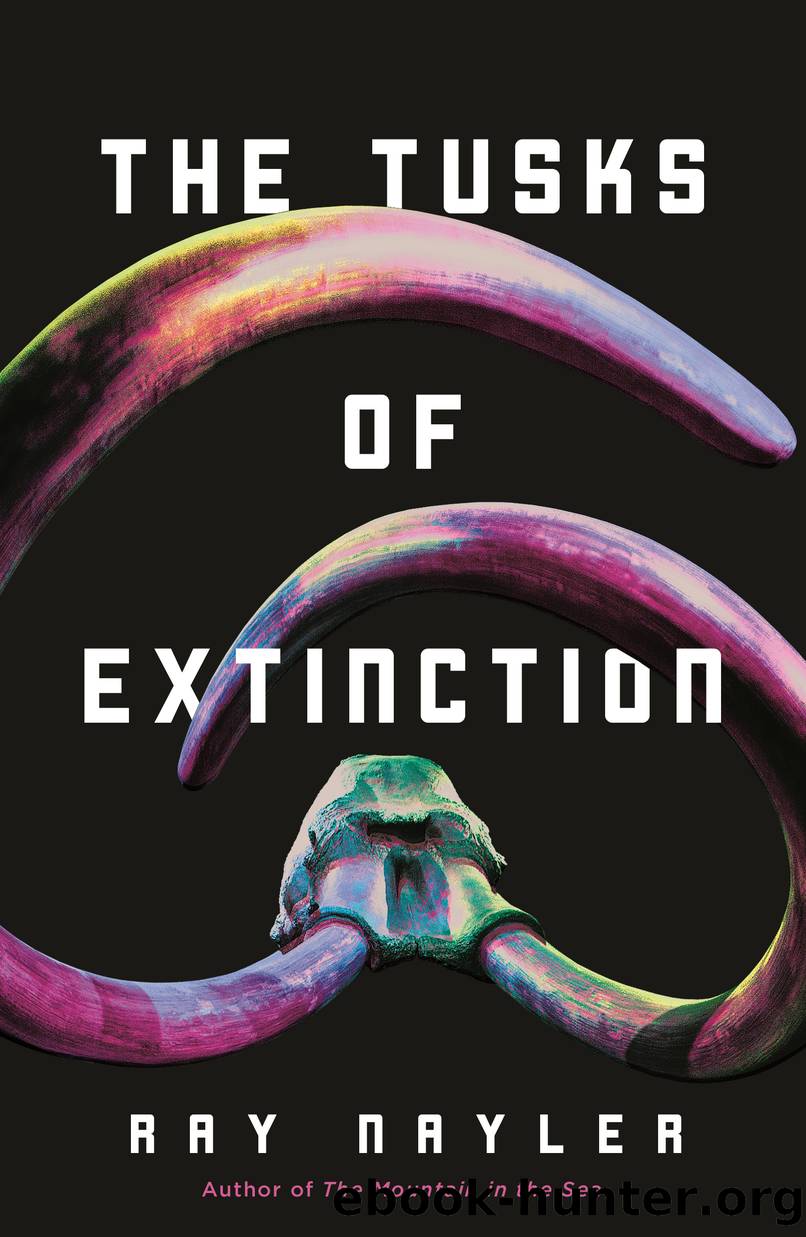The Tusks of Extinction by Ray Nayler

Author:Ray Nayler
Language: eng
Format: epub
Publisher: Tor Publishing Group
* * *
WAMUGUNDA SAT IN front of the small fire they had made. The air had grown cool with the sunset. He had seen Damira shivering, and then gathered wood. She had wanted to protestâbut they had no tent with them, no sleeping bags, no shelter but the Land Rover.
Their Land Rover had broken down while they were driving a transect in search of a herd. Here, the elephants were not tagged: they roamed free and unmonitored. The rangers did not trust the tags and drones still being used in the other parks. Tagged elephants, they said, were found by the poachers first. Herds sighted by monitor drones were attacked. So here, they found the elephants the old wayâthey went out and looked for them.
The biologists and rangers tracked the elephants by finding fresh dung, the raw wood of branches they had broken and stripped, the depressions of their padded feet at the watering holes. It was safer. But when their front axle broke, Wamugunda and Damira found that the carâs electrical had failed as well, including the fuse for the charging station. Their terminals were dead.
They were alone, and it would be a long walk back to the camp the next day. But there was enough food and water, and they knew the wayâso they were not worried. Their pleasure in studying and watching the elephants had already been scarred by the poachersâ incursions into the park but it was not yet the worst of times, when the rangers and the biologists themselves would be targeted. The price of ivory was spiraling out of control, but the ivory wars that had already wiped out populations in Sudan, South Africa, and the Congo had not yet come here.
There was still some degree of innocence, which turned this mishap on a routine transect into an adventure. An unplanned camping trip; a welcome diversion from their mounting problems.
Wamugunda was telling her about his days as a student in Hong Kong. On scholarship, on an island, studying species preservation in the most densely human-populated place on earth.
âNowhere,â Wamugunda said, âcould there have been a world that was more human, more urban, more different from rural life here.â
Wamugundaâs father and grandfather had both been rangers in the park. He had never been an urban Kenyan, and before his student days, had never even traveled to Nairobi.
âMy urban metaphor was termite mounds. That was what Hong Kong seemed like to meâtowers like termite warrens, of steel and glass instead of red earth. You always looked at people from above, or saw them in crowds that made them faceless. Too many people, and they become identical.
âI grew up here, where you learn every animal and person by nameâtheir qualities, their capacities, where they fit in. You learn to identify them from far offâby their gait, their silhouette. But in Hong Kong everything was compressed, anonymous, tangled. Everything was the crowd, the mass. And I was always on the outside.
âIt was not the color of my skinâthough that was a part of itâor my scholarship statusâthough that, too, played a role.
Download
This site does not store any files on its server. We only index and link to content provided by other sites. Please contact the content providers to delete copyright contents if any and email us, we'll remove relevant links or contents immediately.
Sita - Warrior of Mithila (Book 2 of the Ram Chandra Series) by Amish(54850)
The Crystal Crypt by Dick Philip K(36851)
Cat's cradle by Kurt Vonnegut(15326)
Always and Forever, Lara Jean by Jenny Han(14884)
Ready Player One by Cline Ernest(14632)
The Last by Hanna Jameson(10245)
Year One by Nora Roberts(9779)
Persepolis Rising by James S. A. Corey(9345)
The remains of the day by Kazuo Ishiguro(8967)
Never let me go by Kazuo Ishiguro(8872)
Red Rising by Pierce Brown(8750)
Dark Space: The Second Trilogy (Books 4-6) (Dark Space Trilogies Book 2) by Jasper T. Scott(8165)
The handmaid's tale by Margaret Atwood(7750)
The Circle by Dave Eggers(7100)
Frank Herbert's Dune Saga Collection: Books 1 - 6 by Frank Herbert(7050)
The Testaments by Margaret Atwood(6877)
Legacy by Ellery Kane(6647)
Pandemic (The Extinction Files Book 1) by A.G. Riddle(6525)
Six Wakes by Mur Lafferty(6232)
